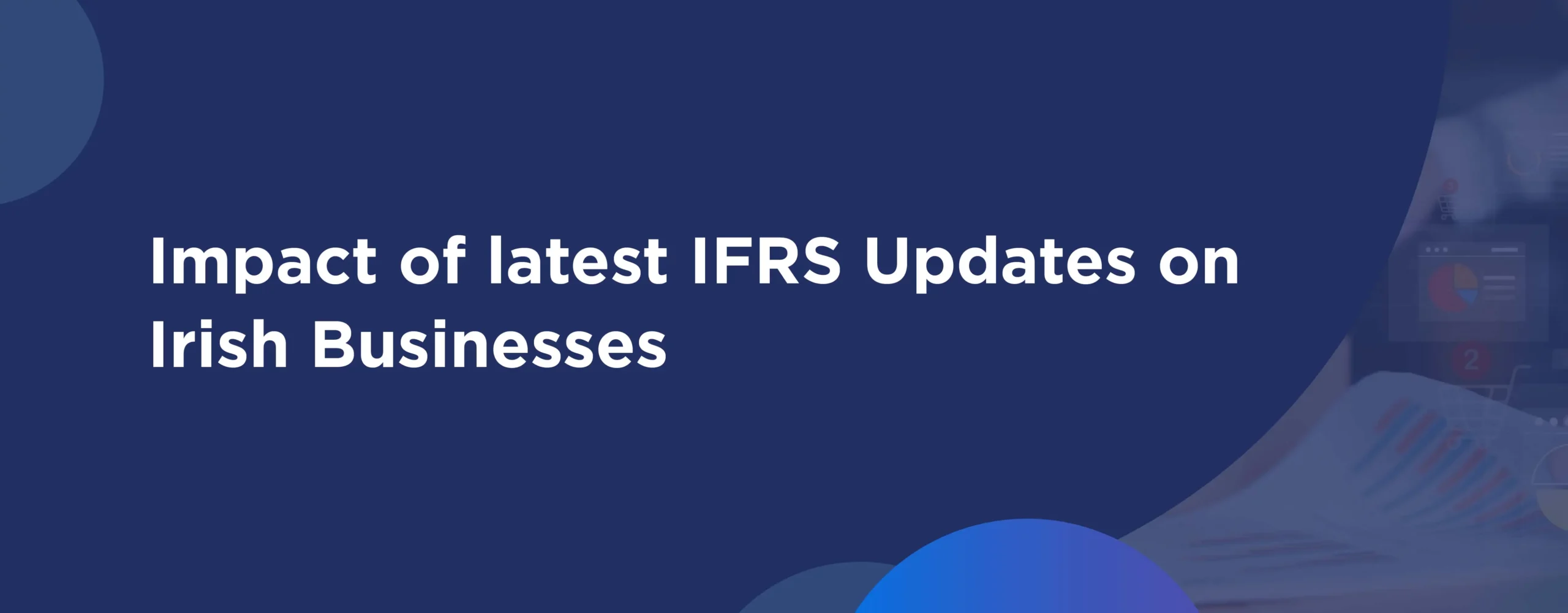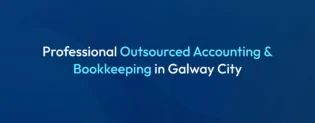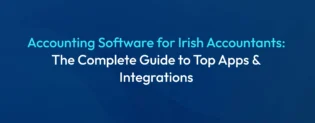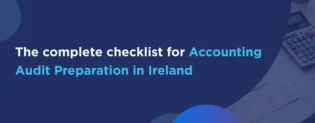
The latest IFRS standards Ireland is bringing major changes to how businesses report their finances. Starting in 2025, Irish businesses will need to update their financial systems and processes to comply with new IFRS standards affecting lease accounting, revenue recognition and financial instruments. These changes will significantly impact financial reporting, requiring careful planning and adaptation.
Understanding how latest IFRS changes affect Irish businesses is crucial for staying compliant and competitive. These updates align Irish accounting with global standards, creating both challenges and opportunities for organisations. This guide explains what changed & what to do.
These IFRS updates remain relevant for both the 2025 and 2026 reporting periods, with a continued focus on consistent application and high-quality disclosures.
Is IFRS used in Ireland?
Yes, IFRS is widely used across Ireland. Listed companies must follow full IFRS accounting standards Ireland for their financial statements. Meanwhile, many small and medium-sized businesses use FRS 102, which aligns with IFRS for SMEs Ireland principles.
The Irish accounting landscape relies heavily on international standards. This alignment ensures consistency and comparability across markets. Companies preparing for IFRS updates in Ireland 2025 need to understand these connections.
Overview of IASB IFRS updates relevant to Ireland
The International Accounting Standards Board (IASB) continues developing new standards. IASB IFRS changes 2025 focus on improving transparency. Key developments include IFRS 18 and IFRS 19, both effective from January 2027.
These standards aim to enhance financial reporting improvements Ireland by providing clearer guidance on presentation and disclosure requirements. Early adoption is permitted, giving companies flexibility in implementation timing.
In addition to specific standard-level amendments, Irish firms should also be aware of broader IFRS reporting priorities as they move into 2026
IFRS Outlook for 2026
Looking ahead to 2026, the IASB has signalled a continued focus on improving disclosure effectiveness, consistent application of existing standards, and post-implementation reviews rather than introducing significant new standards. For Irish firms, this means greater scrutiny on judgement, assumptions, and clarity in financial reporting rather than wholesale changes to accounting frameworks.
See related post : Navigating Accounting in Ireland
What is FRS 102?
FRS 102 is the predominant accounting standard for Irish SMEs. It provides a simplified framework compared to full IFRS while maintaining high-quality reporting standards. The FRS 102 standard applies to thousands of businesses across Ireland.
FRS 102 latest version and key changes
The FRS 102 latest version was released in March 2024 by the UK Financial Reporting Council (FRC). This update represents the second periodic review since the standard’s introduction in 2013.
The amendments take effect for accounting periods beginning on or after 1 January 2026. However, companies can adopt changes early if they apply all amendments simultaneously.
FRS 102 requirements overview
The updated FRS 102 requirements focus on three main areas:
- Lease accounting alignment with IFRS 16 principles
- Revenue recognition following IFRS 15 framework
- Enhanced disclosures for various accounting topics
These changes bring FRS 102 guidance closer to international standards while avoiding unnecessary complexity for smaller businesses.
Major changes in IFRS Ireland
Unless otherwise stated, these amendments continue to apply in 2026 and are expected to remain relevant until further IASB updates are issued.
1. FRS 102 updates Ireland: Lease accounting transformation
The most significant change involves IFRS 16 lease accounting Ireland principles. The new model eliminates the distinction between finance and operating leases for lessees.
Key changes:
- All leases must be recognised on the balance sheet.
- Companies record right-of-use (ROU) assets and lease liabilities.
- Exceptions exist for short-term and low-value leases.
- Depreciation replaces straight-line rent expense.
Impact on financial statements:
| Aspect | Old method | New method |
|---|---|---|
| Balance Sheet | Operating leases off balance sheet | All leases on balance sheet |
| Income Statement | Straight line rent expense | Depreciation + Interest expense |
| Cash Flow | Operating activities | Split between operating/financing |
| EBITDA | Lower (includes rent) | Higher (excludes depreciation) |
The practical impact of IFRS amendments on Irish SMEs includes changes to key financial metrics. EBITDA will increase as depreciation replaces rent. Net debt will rise due to lease liability recognition.
Businesses should review their lease agreements and update accounting systems to recognise all leases on the balance sheet.
2. Revenue recognition: IFRS 15 for SMEs
The FRS 102 updates introduce the five-step model from IFRS 15 revenue recognition standard. This brings consistency to how companies recognise revenue from contracts with customers.
The Five-step model:
| Step | Description | Key consideration |
|---|---|---|
| 1 | Identify the contract | Must be enforceable |
| 2 | Identify performance obligations | Separate distinct goods/services |
| 3 | Determine transaction price | Include variable consideration |
| 4 | Allocate price to obligations | Based on standalone selling prices |
| 5 | Recognise revenue | When control transfers |
This represents a fundamental shift in IFRS 15 revenue recognition Ireland practices. Companies with complex contracts must carefully analyse their arrangements to determine proper timing.
Companies with complex sales contracts must carefully evaluate performance obligations under the new revenue recognition model.
3. Financial instruments changes
The FRS 102 amendments remove the option to apply IAS 39 recognition principles for new adopters. Entities already using IAS 39 can continue, but new entities must follow updated FRS 102 guidance.
This change affects how businesses measure and report financial instruments. Companies need robust processes for classification and measurement decisions.
Financial institutions need to adjust their classification and measurement processes for financial instruments in line with updated IFRS requirements.
4. Fair value measurement standards
A new Section 2A introduces comprehensive fair value measurement guidance. This aligns with IFRS 13 principles, providing clearer instructions for valuing assets and liabilities at fair value.
The guidance covers:
- Fair value hierarchy definitions.
- Valuation techniques and inputs.
- Disclosure requirements.
See related post : How to simplify Accounting for Small Business?
Guide to new IFRS Standards for businesses in Ireland
IFRS 18: Presentation and disclosure
IFRS 18 supersedes IAS 1 for periods starting 1 January 2027. The standard introduces a more structured statement of profit or loss with defined categories and enhanced aggregation guidance.
Major Features:
- Operating profit definition: Clear guidance on classifying items
- Management performance measures: New disclosure requirements for MPMs
- Expense analysis: Additional disclosures when presenting by function
- Enhanced comparability: Standardised presentation across entities
Companies applying full IFRS accounting standards Ireland must prepare for these presentation changes. The standard requires retrospective application with detailed reconciliation in the adoption year.
IFRS 19: Subsidiary financial statements
IFRS 19 offers eligible subsidiaries a simplified disclosure framework. This voluntary standard reduces reporting burden while maintaining IFRS compliance.
Eligibility criteria:
- Entity must be a subsidiary
- Cannot have public accountability
Key benefits:
- Reduced disclosure requirements
- Maintained IFRS compliance
- Lower preparation costs
- Streamlined reporting process
Subsidiaries considering IFRS 19 should evaluate cost-benefit implications carefully. The standard provides relief from extensive disclosures while preserving financial statement quality.
Additional FRS 102 Financial Reporting changes
Supplier finance arrangements
New Section 7 disclosures require companies to explain supplier financing arrangements. This includes impact on financial position and cash flows. These requirements take effect 1 January 2025.
Uncertain tax treatments
Section 29 now includes guidance aligning with IFRIC 23 principles. Companies must evaluate uncertain tax positions and determine appropriate recognition and measurement approaches.
Share-based payments
Enhanced Section 26 guidance covers:
- Vesting condition accounting
- Fair value determination methods
- Payments with cash alternatives
Going concern disclosures
Section 3 requires management to affirm consideration of future information. Companies must disclose significant judgements about going concern status.
Business combinations
Updated Section 19 provides clearer guidance on identifying acquirers in business combinations. This aligns with IFRS 3 principles.
Impact analysis: What is the impact of IFRS?
Financial statement effects
The IFRS impact on Irish businesses varies by sector and size. Companies with significant leases or complex revenue arrangements face the biggest changes.
Key impacts:
| Area | Impact | Severity |
|---|---|---|
| Balance Sheet | Increase in assets and liabilities | High |
| Income Statement | Change in expense timing | Medium-High |
| Cash Flow Statement | Reclassification of payments | Medium |
| Financial Ratios | Changes to debt, EBITDA, ROA | High |
| Covenant Compliance | Potential breaches | High |
Operational implications
Changes to IFRS Ireland extend beyond accounting. Companies need updated systems, processes and controls to capture required information.
Required capabilities:
- Contract management systems for lease and revenue data.
- Discount rate calculations for lease accounting.
- Performance obligation tracking for revenue.
- Enhanced financial modelling capabilities.
Industry-specific considerations
Certain sectors face unique challenges:
Retail and hospitality:
- Extensive lease portfolios require significant work
- Store and property leases affect balance sheets materially
- ROU asset depreciation changes expense patterns
Technology and software:
- Complex licensing and subscription arrangements
- IFRS 15 for SMEs significantly impacts revenue timing
- Multi-element contracts require careful analysis
Manufacturing and distribution:
- Equipment leases and facility rentals
- Warranty and service contract accounting
- Variable consideration in sales agreements
See related post : Affordable outsourced accounting and bookkeeping services in Cork city
When did the most recent changes to IFRS 15 become effective?
IFRS 15 originally became effective for annual periods beginning on or after 1 January 2018. However, the incorporation of IFRS 15 revenue recognition standard principles into FRS 102 takes effect 1 January 2026.
Irish SMEs using FRS 102 have additional time to implement the five-step revenue model. This delayed timeline allows smaller businesses to learn from larger companies’ implementation experiences.
Early adoption is permitted if companies apply all FRS 102 amendments together. This flexibility helps businesses align implementation with strategic priorities.
Preparing for IFRS updates in Ireland 2025
Step 1: Impact assessment
Companies should conduct thorough assessments of how changes affect their specific circumstances. This includes reviewing lease portfolios, revenue contracts and financial instruments.
Assessment checklist:
- Inventory all lease agreements
- Catalogue revenue contracts and terms
- Review financial instruments portfolio
- Identify supplier finance arrangements
- Evaluate uncertain tax positions
Step 2: System and process updates
Implementing changes requires robust systems and processes. Companies need capabilities to capture contractual terms, perform calculations, and generate required disclosures.
Technology requirements:
| System Need | Purpose | Priority |
|---|---|---|
| Lease management | Track ROU assets and liabilities | High |
| Contract database | Store revenue agreement details | High |
| Calculation engine | Compute discount rates and allocations | High |
| Reporting tools | Generate enhanced disclosures | Medium |
Step 3: Financial analysis and planning
Companies must understand impacts on key metrics and covenant compliance. This requires detailed financial modelling and scenario analysis.
Key metrics to analyse:
- EBITDA changes from lease accounting
- Debt ratios including lease liabilities
- Revenue timing under new recognition rules
- Cash flow presentation differences
Step 4: Stakeholder communication
Clear communication with lenders, investors and other stakeholders is essential. Explain expected changes and manage expectations around financial metric movements.
Step 5: Training and development
Finance teams need comprehensive training on new requirements. This ensures accurate implementation and ongoing compliance.
Training topics:
- Lease identification and measurement
- Five-step revenue model application
- Fair value measurement techniques
- Enhanced disclosure preparation
Practical Impact of IFRS Updates on Irish Firms
- Loan covenant classification
- Lease accounting implications
- Disclosure quality expectations
- Audit and group reporting readiness
Irish firms should always refer to the latest IASB publications and auditor guidance when applying IFRS updates.
Role of Financial Accounting Advisory Service
Many businesses benefit from external financial accounting advisory service support during transition. Professional advisers provide expertise in interpreting and applying complex standards.
Advisory services include:
- Impact assessments and gap analysis
- Policy development and documentation
- System implementation support
- Training and knowledge transfer
- Ongoing technical accounting support
Engaging advisers early helps companies avoid implementation pitfalls and ensure smooth transitions.
IFRS Sustainability Reporting Ireland
Beyond traditional financial reporting, IFRS sustainability reporting Ireland is gaining importance. The International Sustainability Standards Board (ISSB) develops standards for sustainability-related disclosures.
While not yet mandatory in Ireland, companies should monitor developments. Sustainability reporting will likely become required for many businesses in coming years.
| Aspect | FRS 102 | Full IFRS |
|---|---|---|
| Scope | Private entities, SMEs | Listed companies, public interest |
| Complexity | Simplified | Comprehensive |
| Disclosure | Reduced requirements | Extensive disclosures |
| Fair Value | Limited use | More frequent requirement |
| Updates | Every 5 years | Continuous development |
Understanding these differences helps companies choose appropriate frameworks and prepare for potential future changes.
IFRS Audit considerations
The changes to IFRS Ireland create implications for IFRS audit processes. Auditors must evaluate management’s judgements and verify compliance with
new requirements.
Audit focus areas:

Companies should discuss implementation plans with auditors early. This ensures alignment on interpretation and documentation requirements.
Practical impact of IFRS amendments on Irish SMEs
Cost considerations
Implementing changes involves costs for:
- System upgrades and new software
- External advisory support
- Staff training and development
- Additional audit fees
Smaller businesses may find costs disproportionately high relative to size. Planning and budgeting for these expenses is crucial.
Benefit realisation
Despite costs, the updates bring benefits:
- Improved financial information quality
- Enhanced comparability with peers
- Better stakeholder understanding
- Alignment with global standards
Timing strategy
Companies should develop clear implementation timelines. Consider:
- Early adoption for competitive advantage
- Phased approach for complex changes
- Coordination with other business initiatives
- Adequate testing and validation time
IFRS Financial statements: Enhanced quality
The changes ultimately improve IFRS financial statements quality. Enhanced disclosures provide stakeholders with better information for decision-making.
Quality improvements:
- Greater transparency on lease commitments
- Clearer revenue recognition policies
- Consistent fair value measurements
- Comprehensive performance metrics
These improvements benefit investors, lenders, and other users of financial statements.
What are the common pitfalls and how to avoid them?
Failing to address the updates properly can lead to material errors, restatements, and audit qualifications.
| Pitfall | Description | Solution |
|---|---|---|
| Underestimating the scope | Treating the change as purely a finance exercise, ignoring operational and IT impacts. | Establish a cross-functional project team (Finance, IT, Legal, Operations/Estates) early. |
| Poor data quality | Lease agreements are stored in various formats (e.g., paper, PDFs) or key terms are missing. | Initiate a comprehensive data-gathering exercise now and centralise all contracts in a dedicated register. |
| Incorrect discount rate | Applying an inappropriate interest rate for lease liability calculation. | Document a clear policy for determining the ‘obtainable borrowing rate’ and ensure a consistent methodology is applied. |
| Overcomplicating revenue | Trying to apply the five-step model to every simple contract. | Use the practical expedients and portfolio approach provided in FRS 102/IFRS 15 for similar, high-volume contracts. |
| Delayed stakeholder talk | Waiting to inform banks or shareholders about the change in financial metrics. | Proactively communicate the likely impact on EBITDA and debt-related covenants to lenders well in advance of the new year end. |
Future outlook
Beyond the immediate changes of FRS 102 (2026) and IFRS 18/19 (2027), Irish businesses must monitor ongoing developments from the IASB and related regulatory bodies:
- IFRS Sustainability Reporting Ireland: The International Sustainability Standards Board (ISSB) is developing IFRS S1 and S2. While not yet mandatory for most Irish businesses, these standards are gaining traction globally and will likely become a mandatory reporting requirement for large companies in the coming years under EU legislation (e.g., CSRD).
- IFRS 17 Insurance Contracts: Effective from 2023, IFRS 17 replaces IFRS 4 with a unified approach to insurance accounting. It introduces current value measurements, risk adjustments, and new disclosure obligations, significantly impacting insurers and related entities.
- Post-Implementation Review: The IASB routinely reviews standards post-implementation (e.g., the current review of IFRS 9 on financial instruments). Future changes could arise from these reviews.
See related post : What are Real Estate Accounting Services and why are they important?
Conclusion
The impact of latest IFRS updates on Irish businesses is substantial and far-reaching. From FRS 102 amendments affecting SMEs to IFRS 18 and 19 impacting listed companies, organisations face significant changes.
Understanding how latest IFRS changes affect Irish businesses helps companies prepare effectively. The guide to new IFRS standards for businesses Ireland emphasises the importance of early planning and systematic implementation.
Companies should begin preparing now for these financial reporting standards Ireland changes. Conducting thorough assessments, updating systems, training staff and engaging advisers ensures successful transitions.
The practical impact of IFRS amendments on Irish SMEs includes both challenges and opportunities. While implementation requires investment, the resulting improvements in financial reporting quality benefit all stakeholders.
By following this overview of IASB IFRS updates relevant to Ireland and taking proactive steps, businesses can successfully navigate these changes and emerge with stronger financial reporting capabilities.
Contact us today via call +353 212069255 or mail at info@outbooks.com.
FAQs about Latest IFRS updates
What are the main IFRS updates 2025 Ireland affecting businesses?
How do FRS 102 requirements differ from full IFRS?
What is the practical impact of IFRS amendments on Irish SMEs?
When did the most recent changes to IFRS 15 become effective?
Is IFRS used in Ireland for all businesses?
What is IFRS 16 lease accounting Ireland impact?
How should companies prepare for IFRS updates in Ireland 2025?
What is the role of financial accounting advisory service?
What are IFRS sustainability reporting Ireland requirements?
How do IFRS 15 for SMEs principles work?
What are the key FRS 102 guidance areas updated?
What is the latest IFRS standards Ireland effective date?
How do changes to IFRS Ireland affect financial ratios?
What IFRS audit considerations arise from updates?
Do IFRS financial statements require retrospective application?
Popular Accounting Posts
- Year End Accounting Checklist for Irish Businesses
- How Virtual Accounting Services Are Transforming Businesses in Ireland
- The Importance Of Regular Financial Audits For Small Business
- Things to Do When Irish Revenue Audits Your Accounting Firm
- Navigating Brexit: Accounting Implications and Strategies for Irish Businesses
- Dublin Accountants: Your Partner in Financial Excellence
Parul is a content specialist with expertise in accounting and bookkeeping. Her writing covers a wide range of accounting topics such as payroll, financial reporting and more. Her content is well-researched and she has a strong understanding of accounting terms and industry-specific terminologies. As a subject matter expert, she simplifies complex concepts into clear, practical insights, helping businesses with accurate tips and solutions to make informed decisions.








